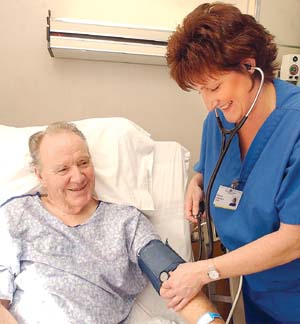
To help combat a nationwide nursing shortage, Hazel Hawkins
Hospital has started a program to allow student nurses to complete
some of their schooling at the hospital.
The program, which is the first of its kind at Hazel Hawkins,
will help the hospital recruit nurses in the long run, said Linley
Stanger, nursing administrator at the hospital.
To help combat a nationwide nursing shortage, Hazel Hawkins Hospital has started a program to allow student nurses to complete some of their schooling at the hospital.
The program, which is the first of its kind at Hazel Hawkins, will help the hospital recruit nurses in the long run, said Linley Stanger, nursing administrator at the hospital.
The program currently involves student nurses from Gavilan Community College. The nurses are able to complete part of their required clinical, hands-on rotations at Hazel Hawkins.
It also initiates them into the Hazel Hawkins family, Stanger said.
“Once the students come over here in rotation, then when they graduate they’re more comfortable coming here to work,” she said. “Plus our nurses enjoy teaching, so as a group they’re very good at mentoring and teaching.”
The program was facilitated by a grant Gavilan received from the state in 2003 called the “Nursing Workforce Initiative” grant, which provided the funding to include Hazel Hawkins as a student location.
Last year, the hospital partnered with the Hospital Foundation to set up a tuition reimbursement program to help nursing students with tuition fees.
With the funding from the three-year workforce initiative grant, the Foundation’s allocation of $15,000 this year provides even more of a catalyst to help bolster Hazel Hawkins’ nursing program.
“It’s really difficult, especially in a rural area, to recruit,” said Leah Dowty, the Foundation director. “We’re kind of concentrating our efforts.”
Currently there are nine student nurses in the five-week rotation, which is headed by Gavilan instructor Anita Gallardo.
Gallardo, who is a registered nurse and holds a Masters of Science in Nursing, is also a student nurse practitioner who is receiving tuition assistance from the Foundation’s allocated funds.
Under her supervision, the student nurses work at the hospital from 6:30 a.m. to 1 p.m. Monday and Tuesday, practicing the skills they’ve already been trained to do in the classroom.
They are able to get hands-on experience in various settings such as the Emergency Room, surgery, the Intensive Care Unit and obstetrics.
“It’s been a really good experience for them,” Gallardo said. “What they’ve said to me is that we’re really welcoming, that everyone answers their questions and they’re eager to teach them.”
As a payroll technician at Hazel Hawkins for years, Brenda Wilkerson had always been interested in nursing but never had the chance to capitalize on it until recently.
When her father became ill with brain cancer, the effect of the nurses’ care on her father and family confirmed Wilkerson’s decision in a career change.
“Just watching the nurses come in and take care of him… the respect and dignity they let him retain while he was a patient,” Wilkerson said. “I knew at that point that I needed to do something a little more with my life.”
Wilkerson, 41, is in her first year of the LVN program and will graduate in 2005. Going back to school required a lot of sacrifice for her husband and two children, but nevertheless they are excited for her, she said.
Between the homework, the rotations and the long hours, Wilkerson has developed a new respect for the job nurses do, she said.
“I expected a lot of (hand holding) and saying, ‘Oh, it’s OK honey,'” she said. “And I’m sitting here the first day with my first clinical patient thinking, how do you people take this? It is physically exhausting – but it’s a good exhausting.”
Karynn Rericha’s grandmother was a nurse at Hazel Hawkins for 45 years until she retired about five years ago.
When Rericha informed her grandmother that she was going to be entering the nursing field, “she told me I should have gone into it long before,” Rericha said.
After working as a behavioral specialist with severely emotionally disturbed children for a while, the 26-year-old student nurse decided it just wasn’t for her and she wanted a more healing and interactive profession.
“I had no idea what I was getting into – it was like, let’s go see,” she said. “But you’re helping people… it’s improving the quality of life.”
When the grant money runs out in 2006, Hazel Hawkins administrators are banking on Gavilan receiving some other grants so the student nursing program can continue, Stanger said.
“I believe establishing a strong educational environment benefits everyone involved,” Stanger said. “And we really enjoy having them here.”









